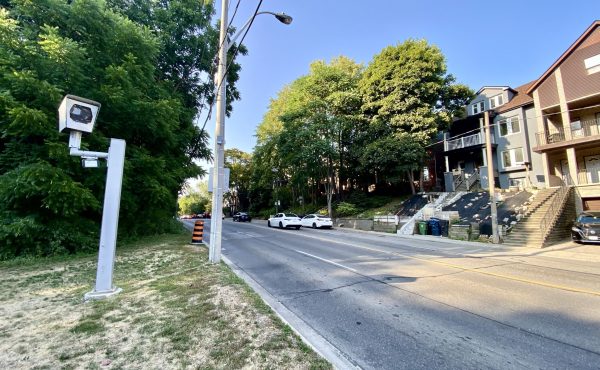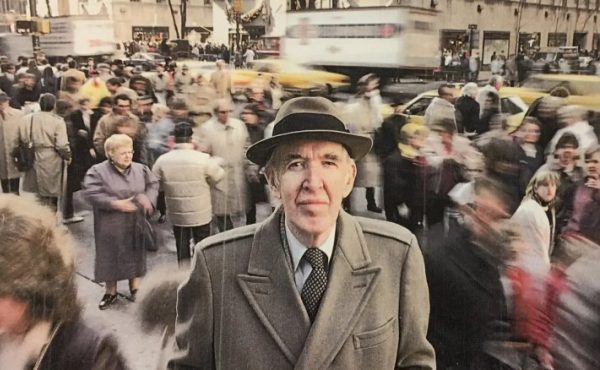
How many times, since Mayor Rob Ford took office, did we hear how his patrons in Ottawa would make subway dollars appear, both as a reward to the good folk of Scarborough for seeing the conservative light, municipally-speaking, but also as a sly down-payment for future federal elections?
As recently as this month, Prime Minister Harper turned up at Toronto’s island airport and waxed on about how he prefers to take subways when he takes transit (which, I’m guessing, is something he hasn’t done in many a moon).
But last week’s federal budget contained no new money for transit, much less a subway. Despite positioning the 2012 budget as a kind of long-term planning document, the Tories had nothing to say about a national transit strategy. They offered no private sector pot-sweeteners (e.g., funds for Triple-P projects). The only (very) remotely transit-oriented move was additional funding for VIA repairs.
In short, the Ford-Flaherty-subway love-in turned out to be nothing more than the usual political bait-and-switch operation (are you listening Scarborough voters?). And the days following the budget announcement the Fords, of course, didn’t call out the Tories for abandoning them on the transit file.
Indeed, the loathed Dalton McGuinty Liberals turned out to be much more trustworthy on the transit file, coming through (in the context of their budget) on the pledge not to whittle more off the $8.4 billion earmarked for rapid transit in Toronto. The brothers had nothing to say about that budget either, even though, as we all know, the LRT will create untold #StClairDisasters in ‘burbs.
Tim Hudak, the provincial Tories’ comedian-in-chief, continues to carry the cross for Ford’s subway, as Torontoist reported last week; the ironies and mis-statements in their pamphlets are too ripe to repeat in a family-oriented blog.
The upshot of all this fiscal bondage is that the future of transit funding in Canada is cloudy indeed. The Canadian Urban Transit Association estimates [PDF] that Canadian cities need to spend about $53.5 billion on transit in the next five years, with 73% for expansion and the balance for state-of-good-repair. CUTA points out that three-quarters of that total is covered by existing government programs. In other words, there’s a $13.5 billion black hole through 2016.
Where all that extra cash will come from is anyone’s guess. The Federation of Canadian Municipalities continues to hope against hope that once the Tories eliminate the federal deficit – “over the medium term,” as the budget documents vaguely predict — they’ll get back into significant infrastructure spending again.
Perhaps, but as I reported in Spacing’s national edition from last fall, the problem isn’t just money. The conditions on Ottawa’s infrastructure funds are so loose that the gas tax — once envisioned to be a major source of transit funding — ends up paying for all sorts of other capital projects. Proof? The Tories’ own assessment of how they spent the $5.4 billion infrastructure component of their three-year economic stimulus plan indicates that no money ended up in transit.
For a government that espouses economic growth as its highest priority, this is a perplexing oversight. There is broad, non-ideological consensus that gridlock is taking a $6 billion chunk out of the Greater Toronto economy each and every year. That well-known pinko sleeper cell, the Toronto Board of Trade, has said repeatedly that the lack of transit investment in the region is a hit on business. So has John Tory’s CivicAction coalition, yet another hot bed of wooly-headed activists.
In the name of Western economic development, the Tories are happily dismantling the regulatory mechanisms that compel resource companies to maintain environmentally sustainable business practices. But in urban regions in central Canada, you need different policy levers to boost the economy, and more efficient transportation networks are at the top of that list. Instead, the Tories are spending unspecified gazillions locking up Canadians in super jails – certainly one of the most economically counter-productive fiscal policies I can imagine.
My worry is that Harper’s Tories, still in the spring of a majority government, have absolutely no intention of getting back into the urban or regional transit game. We know the prime minister is a devout believer in the division of powers set out in the constitution. And his recent moves on health care funding strongly suggest that he’d like to see Ottawa ease itself out of the bandage-and-bedpan business.
With health care, the federal role is well-established, framed by legislation, and sustained by whatever remains of Canada’s sense of social compact. The notion that modern, integrated transit infrastructure plays a role in national economic development is a relatively new concept for Canadians — although many other countries in Europe and Asia arrived at that particular conclusion a long time ago.
Yet in Harper’s originalist understanding of how Canada works (or was supposed to work in 1867), it seems increasingly clear that the feds believe this type of investment as properly and exclusively the purview of the provinces. (Their cost structure thus reduced, the horizon looks bright for more Conservative majorities.)
And therein lies the dilemma: with health care and education swallowing provincial budgets, and with Ontario’s economy hog-tied by recession-induced debt levels and a high loonie, the provincial spending squeeze only gets tighter over time.
National transit strategy? I’m not even sure we’ll ever see the return of a provincial transit strategy.
photo by Sam Javanrouh





10 comments
Canada is the only western democratic country that does NOT have a continuous funding of public transit operations in urban areas. Canada may do special one-time capital funding, but only once in a while.
Maybe it is time to give up on the Feds and go local with broad base tax ie regional sales tax to fund transit. McGuinty missed the moment when Harper dropped the GST rate to seize that room to create an transit tax.
The only way Toronto will get transit money from the city-hating NeoCon cabal in Ottawa is if you could figure out a way to make it:
A: Deliver warheads in Islamic states.
B: Deliver Pit-Bull McKay from his holiday lovenest.
C: Deliver Mrs. Harper anywhere but Sussex Drive.
or
D: Deliver a real majority instead of the stolen one the Cons got last time.
Hey, W.K.
Do we still get to call ourselves a ‘Western Democracy’ when the government appears to have stolen the election?
Damn, I wish we had a governor general to step in and investigate. Oh? We do? But he won’t? Pity. Only in Canada, you say?
To your point, I wonder if that other ‘Western Democracy’ of which our Mr. Harper is so fond has a national transit funding strategy… I thought the strategy was cheap oil…
For starters, Toronto has already received some pretty hefty higher government funding for transit expansion – it all just came from the Province. Still, that shouldn’t matter because:
a) the Feds have never historically been involved in municipal affairs and funding,
b) the amount of money that Toronto got for transit expansion from the Provincial government in the last few years is unprecedented: $8.4B for Transit City (with no strings attached), $800M for Spadina and more for various Metrolinx projects (I don’t know how much, but it is in the hundreds of millions) and TTC fleet renewal. All told, we are probably the recipients of well over $10B in provincial money dedicated solely to public transit.
I don’t think we have any right to complain about not getting enough transit expansion funding from higher governments. If we can’t use that $10B wisely, that’s more our problem than theirs.
c) The amount of money we already got from the province is justification that the Feds don’t need to kick in any more. Even so, they did contribute $700M for the Spadina extension.
Secondly, even though the Harper government isn’t mandated to support urban projects (see (a)), there still are examples where the government is putting billions of dollars into urban infrastructure, most notably the $5B that will be spent to replace the Champlain bridge in Montreal.
John,
Usually your comments are bang on but you’ve gone off the rails on this one (pun intended).
Asking for more handouts when we’ve been given $8 billion from the province is just greedy. It’s bad enough that people from all corners of Ontario are paying for our LRT’s from Windsor to Ottawa to Thunder Bay and all points in between, but now you are asking for people in Vancouver, Halifax and Winnipeg to chip in too via the Feds because $8 Billion just isn’t enough??
Where do you get this divine entitlement for Transit Funds for Toronto? You do realize the City of Toronto was granted the powers of taxation to do things like raise revenue for Transit projects? Maybe you were too busy being mad at Scarborough residents who wanted a subway to realize those Scarborough councillors were suggesting a 0.5% tax on goods. I know I would happily accept chipping in a nickel for a subway/LRT/BRT for every $10 spent on goods in the city. Why is paying for it ourselves such a foreign concept?
Why does someone else always have to pay for it? I know the truth – a Toronto Transit Tax will never go into a “Transit Fund” – it will always get lost in the mix and fall into the area of general revenues like the Gas Tax does – but shouldn’t we give it a try first?
The Feds can be blamed for a LOT of things, but not this time and not this budget.
To Leonard and JW:
I think you might be missing Lorinc’s point. Its not so much about the Feds paying for our projects, its about a national transit strategy and properly funding transit systems LIKE EVERY G8 COUNTRY DOES.
The Feds use the phrase about growing the economy, but if they entirely ignore the biggest impedment to the economy’s growth — congestion — then they are playing a fools game.
Specifically to JW’s point about whether people from “Vancouver, Halifax and Winnipeg” should help pay for our transit — I’d say yes. For the same reason people in Toronto help pay the health care bills of Thunder Bay, or how the wealth from this city pays for the sewers and infrastructure and highways across the province and the country.
Monica I would like to know how you calculated that Toronto is not as subsidised, or in fact subsidises, the rest of the Province?
Leonard and JW:
You’re falling for the spin that has been set into place by the Harris Ontario Tories. Before they came along, the province used to support a significant portion of the TTC’s **operating** expenses. They didn’t like this, so they completely cut this, but to make it look like they were doing something, they started to fund one-off capital projects here and there. It makes them look great because ground-breakings for subways and what-not are great photo ops. But, in the big scheme of things, the city is worse off.
So, before you point to this pot of funding or that pot of funding we’ve received from higher levels of government, remember that we’re generally getting less money than we used to (and less money than other comparable western cities).
Glen: simple math, when examining how much the province collects from Toronto residents vs. how much the province spends on Toronto shows you we put about $1 billion more into the coffers of the province than we get back.